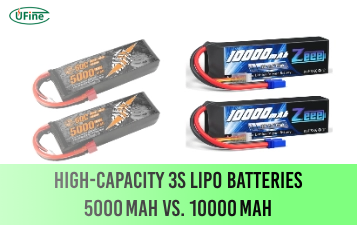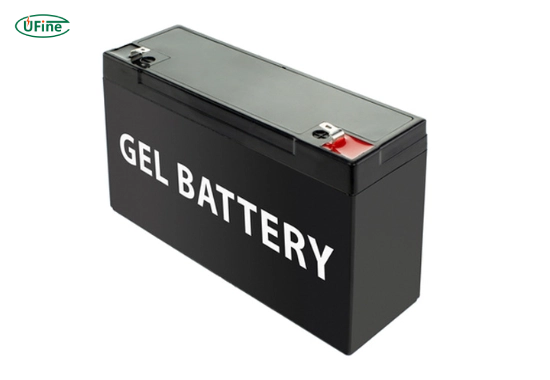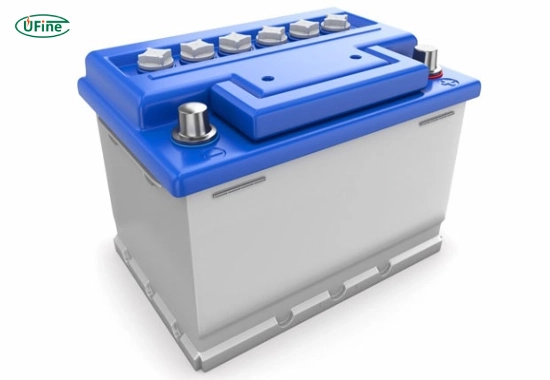When choosing the correct battery for your needs, the debate between gel and lead-acid batteries is crucial. Both types have unique features, benefits, and drawbacks that can significantly affect performance, longevity, and cost. This article compares gel and lead-acid batteries in-depth, helping you decide based on your specific requirements.
Part 1. What is a gel battery?
A gel battery is a specialized lead-acid battery using silica gel to immobilize the electrolyte. This design allows the battery to function effectively in various orientations without the risk of leakage. Gel batteries are mainly known for their deep cycle capabilities, making them an excellent choice for applications that require consistent power over extended periods.
Key Features of Gel Batteries
- Sealed Design: Gel batteries are sealed units that prevent gas emissions during charging and discharging.
- Maintenance-Free: Unlike traditional lead-acid batteries, gel batteries do not require regular maintenance, such as topping up with water.
- Deep Cycle Capability: They can be discharged deeply without significant damage, which extends their lifespan.
- Temperature Tolerance: Gel batteries perform well in extreme hot and cold temperatures.
Part 2. What is a lead-acid battery?
A lead-acid battery is one of the oldest types of rechargeable batteries. It consists of lead dioxide (PbO2) as the positive plate, sponge lead (Pb) as the negative plate and a sulfuric acid solution as the electrolyte. Many industries widely use lead-acid batteries for their reliability and cost-effectiveness.
Key Features of Lead-Acid Batteries
- Affordability: Lead-acid batteries are generally less expensive than gel batteries, making them a popular choice for budget-conscious consumers.
- High Discharge Rates: They can deliver high currents quickly, which benefits applications like starting vehicles.
- Proven Technology: With over 150 years of use, lead-acid technology is well understood and widely available.
Part 3. How do gel batteries work?
Gel batteries operate on the same principles as traditional lead-acid batteries but have a crucial electrolyte composition difference. The gel electrolyte is created by mixing sulfuric acid with silica powder, which thickens the solution into a gel-like consistency. This immobilization prevents spillage and enhances safety.
Advantages of Gel Battery Operation
- Safety: The sealed design minimizes the risks of acid spills and gas emissions.
- Efficiency: Gel batteries exhibit lower self-discharge rates compared to flooded lead-acid batteries.
Part 4. How do lead-acid batteries work?
Lead-acid batteries generate electricity through chemical reactions between the lead plates and sulfuric acid electrolytes. Lead dioxide reacts with sulfuric acid during discharge to produce lead sulfate and water while releasing electrical energy.
Advantages of Lead-Acid Battery Operation
- Simplicity: The straightforward design makes them easy to manufacture and repair.
- Robustness: Lead-acid batteries can withstand rough handling and harsh conditions.
Part 5. Performance comparison: gel vs. lead-acid
When comparing gel and lead-acid batteries, you should consider several performance metrics. Here’s a detailed look at how they stack up against each other:
Lifespan
- Gel Batteries: Typically last between 5 to 15 years due to their deep cycle capabilities.
- Lead-Acid Batteries: Generally last around 3 to 5 years, depending on usage patterns.
Depth of Discharge
- Gel Batteries: Can be discharged up to 80% without significant damage.
- Lead-Acid Batteries: Ideally, they should not be discharged below 50% to avoid damaging the cells.
Charging Speed
- Gel Batteries: Charge more slowly than lead-acid options but require careful charging to avoid damage.
- Lead-Acid Batteries: Charge faster but need regular monitoring to prevent overcharging.
Maintenance Requirements
- Gel Batteries: Maintenance-free; no need for water topping or regular checks.
- Lead-Acid Batteries: Require periodic maintenance, including checking water levels and cleaning terminals.
|
Feature |
Gel Battery |
Lead-Acid Battery |
|
Lifespan |
5-15 years |
3-5 years |
|
Depth of Discharge |
Up to 80% |
Up to 50% |
|
Charging Speed |
Slower |
Faster |
|
Maintenance |
Maintenance-free |
Requires regular checks |
Part 6. Cost comparison: gel vs. lead-acid
Cost is a critical factor when choosing between gel and lead-acid batteries:
- Initial Cost: Gel batteries generally cost more upfront than lead-acid options.
- Long-Term Value: While gel batteries may require a more significant initial investment, their longer lifespan can make them more cost-effective.
Part 7. Applications for gel batteries
Gel batteries are particularly suited for:
- Solar Energy Systems: Their deep cycle capabilities make them ideal for storing solar energy.
- Marine Use: The sealed design prevents leakage in aquatic environments.
- Electric Vehicles: Their ability to handle deep discharges makes them suitable for electric vehicle applications.
Part 8. Applications for lead-acid batteries
Lead-acid batteries are commonly used in:
- Automotive Starting Systems: Their high discharge rates are perfect for starting engines.
- Uninterruptible Power Supplies (UPS): They provide reliable backup power during outages.
- Forklifts and Heavy Equipment: Their robustness suits industrial applications well.
Part 9. Environmental Impact of Gel vs. Lead Acid
Both battery types have ecological considerations:
- Gel Batteries: Generally considered safer due to their sealed design; however, they still contain lead and sulfuric acid.
- Lead-Acid Batteries: While recyclable, improper disposal can lead to environmental hazards due to toxic materials.
Recycling Options
- Both types can be recycled effectively if appropriately managed, reducing their environmental impact.
Part 10. FAQs
-
Can I use a regular charger on a gel battery?
No, using a standard charger may damage a gel battery. To ensure safe charging, it would help to use a charger specifically designed for gel technology. -
How long do gel batteries last?
Gel batteries typically last between 5 to 15 years depending on usage patterns and maintenance practices. -
Are there any safety concerns with using gel or lead-acid batteries?
Both types present safety concerns primarily related to acid leaks or gas emissions; however, gel batteries mitigate these risks due to their sealed design. -
What maintenance do lead-acid batteries require?
Lead-acid batteries require periodic maintenance, such as checking water levels, cleaning terminals, and following proper charging practices. -
Are gel batteries worth the extra cost?
Yes, suppose your application requires deep cycling or operates in extreme conditions where leakage may be an issue. In that case, the benefits of gel batteries often justify their higher price tag.
Related Tags:
More Articles

High‑Capacity 3S LiPo Batteries: 5000 mAh vs. 10000 mAh
Compare 3S LiPo 5000mAh vs 10000mAh batteries by weight, power, and use. Find the best fit for your drone, RC car, or boat setup.
Top 5 Applications for Small 3S LiPo Batteries
Small 3S LiPo batteries power drones, RC gear, wearables, and robotics with high energy and low weight. Making them ideal for compact electronics projects.
Building and Charging Your Own 3S LiPo Pack: A Step‑by‑Step Guide
Learn how to build, balance, and charge a 3S LiPo battery pack safely at home with this complete DIY guide for hobbyists and beginners.
How to Choose the Right LiPo Battery Plug Type?
Discover the best LiPo battery plug types, how to choose them, and expert tips for safe usage, soldering, and maintenance.
Choosing the Right Connector for Your 3S LiPo Battery
Choosing the right 3S LiPo connector depends on current, space, and use. Learn the pros and cons of XT60, JST, EC3, and more.





